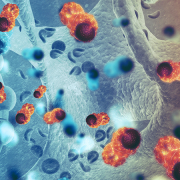New precision medicine approaches to breast cancer
Patients in London and Manchester the first to benefit from methods to better predict, prevent and treat breast cancer, with aims to roll out nationally
Two recent UK studies show how precision medicine approaches are being brought into NHS breast cancer care. Researchers at The Royal Marsden NHS Foundation Trust propose changing criteria for BRCA testing, so fewer carriers are missed; while a new test being offered in Manchester helps women with familial breast cancer understand their risk and treatment options better.
Identifying more patients at risk
Researchers at the Institute of Cancer Research (ICR) and The Royal Marsden NHS Foundation Trust have proposed new criteria to screen for BRCA gene variants that could prevent more than 10,000 cases of breast cancer in the next decade.
NICE recommends that anyone with a 10% or greater chance of having a pathogenic BRCA variant should be offered genetic testing. The new research does not dispute this, but offers an alternative way to decide who has the 10% risk.
Current NHS guidelines involve complex calculations based on data around the family history of cancer. The researchers compared this to a set of criteria based solely on the patient’s own cancer, and the age at which it presented.
The proposed new criteria would suggest testing for all patients diagnosed with ovarian cancer, and those who develop breast cancer before age 45, or cancer in both breasts before the age of 60. All patients with the aggressive ‘triple negative’ form of breast cancer should be offered testing, as should the small number of male breast cancer patients.
Screening would be offered to family members of patients found to be carrying pathogenic BRCA variants, allowing others at risk to be identified, and offered closer monitoring or preventive treatments, such as mastectomy where appropriate.
Professor Nazneen Rahman, head of cancer genetics at the ICR and The Royal Marsden, said the new guidelines would “allow us to help more cancer patients to benefit from precision medicine, and it helps us prevent cancer occurring in healthy people”.
The simpler criteria should help identify more people with the BRCA variants; in the test group, half of those identified would have been missed under existing guidelines. If the proposed changes were made, the number of women eligible for the BRCA genetic test would rise from current 12,000 per year to 27,000 per year.
Professor Rahman said: ”We are now working with other centres across the UK… to roll out the system, so that many more people can benefit.”
Refining risk beyond BRCA
Meanwhile, a new genetic test to accurately predict an individual’s risk of developing breast cancer will soon be available in Manchester. The test may reduce the number of unnecessary pre-emptive mastectomies in people with a family history of cancer.
The test goes beyond BRCA, which only account for 15%-20% of hereditary cancers. Eighteen genetic variations known as SNPs (single nucleotide polymorphisms) are assessed – individually these have small effects on cancer risk, but taken together their effects are significant.
“This new test will help women at risk of familial breast cancer to make more informed decisions about their care,” said Professor Gareth Evans, from the University of Manchester and St Mary’s Hospital, which led the study. “BRCA1 and BRCA2 are just part of what we should be looking for when assessing risk.”
Researchers combined the genetic test results with other factors when calculating risk, including age, height and weight, and family history of breast cancer. The result was that a number of women previously classified as high risk for breast cancer (with a ≥30% chance of developing the disease during their lifetimes) were reclassified as lower risk. Preventative surgeries, such as mastectomy, are recommended for high-risk patients only.
Patients at St Mary’s and Wythenshawe hospitals in Manchester will be first to benefit from this new test, but there are hopes it may be rolled out nationally.









